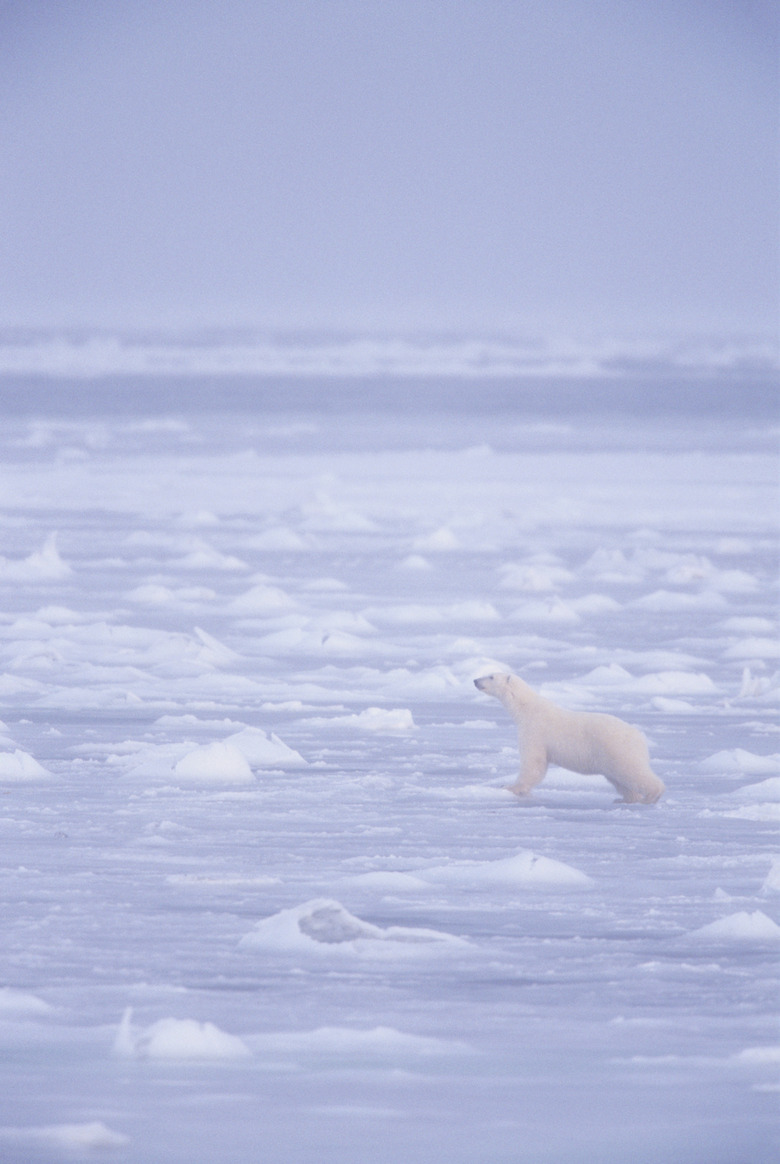How Unfavorable Abiotic And Biotic Factors Affect A Species
Change is a fundamental factor in determining whether a plant or animal species survives, moves out of an area or goes extinct. Changes come in the form of both abiotic and biotic factors. Abiotic factors include all non-living items within an ecosystem, such as temperature and rainfall. Biotic factors are all the living organisms within an ecosystem. Unfavorable abiotic or biotic factors may have dire consequences for a species.
Abiotic Factor: Climate Change
Abiotic Factor: Climate Change
One of the major concerns in the environment is the change in climate seen as a result of increased greenhouse gases, such as carbon dioxide, in the atmosphere. These changes in climate represent an abiotic factor that has a significant impact on various species. For example, the shrinking ice caps – caused by increased temperatures in polar regions – have limited the hunting range of the polar bear, which hunts on sea ice for seals. If the ice caps continue to melt, the polar bear must either adapt, or it will become extinct.
Abiotic Factor: Acid Rain
Abiotic Factor: Acid Rain
Another man-made abiotic factor is increased acid rain. Gases, such as sulphur dioxide and nitrogen oxide, are released into the atmosphere by industries that burn fossil fuels, including coal and oil. These gases react with water and oxygen in the atmosphere to create acid rain. Acid rain can kill plants and animals. Fish populations in lakes and rivers may decline because of the increased acidity in the water, at low pH levels that are not within tolerable ranges for fish.
Abiotic Factor: Natural Disasters
Abiotic Factor: Natural Disasters
Natural disasters – such as earthquakes, volcanoes, fires, hurricanes and tsunamis – can have significant impacts on species. These disasters are difficult to predict and may completely destroy or forever alter an ecosystem. Species that are already endangered may not be able to recover from a loss of habitat or population caused by these forces. In some cases, natural disasters may create barriers in breeding populations, which may result in new species being formed as they adapt to new environments.
Biotic Factor: Invasive Species
Biotic Factor: Invasive Species
Man has become a traveler around the world, and in numerous cases he has brought new species to foreign lands. Sometimes, this has been on purpose and in others it was accidental. _Invasive species_, which are plants and animals that are not native to an ecosystem, may compete with native species for resources, such as food, and typically have no natural predators to restrict their ability to breed and thrive. Invasive species may force out or cause native species to become extinct.
Biotic Factor: Competition
Biotic Factor: Competition
All living things must compete for resources. Ecological competition is when two organisms (or two types of organisms) compete with each other for the same resources in order to survive within an environment. In some ecosystems these resources may vary from year to year.
For example, rabbit populations in a forest may thrive one year then have very few offspring the next. These fluctuations may also affect the predators that feed on these prey items, such as wolves, foxes and owls. These predators must either find an alternate source of prey or risk starvation and death.
Ecological Succession
Ecological Succession
When changes to either abiotic or biotic factors affect an entire ecosystem, ecological succession occurs. Ecological succession is when one community of organisms, such as plants or animals, is replaced by another. An example is a forest fire. The fire burns down the species of trees present in the forest and forces out many animal species. The grasses, trees and animals that reestablish themselves in the area may be different than the ones prior to the fire. The abiotic and biotic factors that were unfavorable to one group of plants and animals are suitable to others that take their place.
Cite This Article
MLA
Carpenter, Michael E. "How Unfavorable Abiotic And Biotic Factors Affect A Species" sciencing.com, https://www.sciencing.com/unfavorable-abiotic-biotic-factors-affect-species-10054269/. 30 September 2021.
APA
Carpenter, Michael E. (2021, September 30). How Unfavorable Abiotic And Biotic Factors Affect A Species. sciencing.com. Retrieved from https://www.sciencing.com/unfavorable-abiotic-biotic-factors-affect-species-10054269/
Chicago
Carpenter, Michael E. How Unfavorable Abiotic And Biotic Factors Affect A Species last modified August 30, 2022. https://www.sciencing.com/unfavorable-abiotic-biotic-factors-affect-species-10054269/
